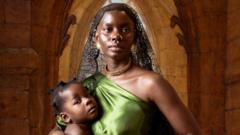After giving birth, photographer Dola Posh found herself in a fight against postnatal depression that shook her very identity. Just six days post-delivery, while isolated in an English hospital amid a COVID lockdown, she began to feel disconnected from herself and her passion for photography. Relatives exacerbated her anxiety with constant calls, and Dola, thousands of miles away from her family in Nigeria, felt lost.
Despite believing she would find herself once her daughter was born, she quickly realized she was no longer the woman she once was. This profound loss of identity can play a significant role in postnatal depression, particularly affecting black women like Dola, who initially did not recognize what was happening to her.
With the chaos of unsolicited parenting advice looming over her and a lack of sleep making her mental state precarious, Dola faced moments of despair severe enough to contemplate suicide. However, her desperation led her to reach out to a health visitor who provided the support she desperately needed. Through therapy, Dola was encouraged to express her pain and feelings through photography.
Having trained in Nigeria's fashion and celebrity photography scene, Dola began to utilize her camera to document her struggles, capturing intimate self-portraits alongside her daughter, Monioluwa. This artistic expression gradually became a lifeline for her, mirroring themes of motherhood that held deeper meanings, influenced by her religious upbringing, which included representations of Mary and Jesus.
As she donned her veil, a symbol of her cultural roots, Dola felt a reconnection to herself and her heritage – a significant part of her recovery. In sharing her raw experiences, she has begun to strip away the shame surrounding motherhood and mental health, advocating for other mothers, especially from the black community, to tackle postnatal depression openly.
Earlier this year, Dola received recognition from camera manufacturer Leica for her work, allowing her to further her artistic journey and support the narratives of struggling mothers. She hopes for a future where black mothers can openly share their experiences without stigma and see themselves represented in the media, challenging the misconceptions surrounding mental health in motherhood.
"It’s revolutionary for a woman to say openly: ‘I almost ended my life but I’m still here.’” Dola says, echoing the importance of resilience and vulnerability in motherhood. Amidst ongoing challenges, she remains committed to portraying her journey through images, shining a necessary light on postnatal depression, and reinforcing that no mother should feel alone in their struggles.





















